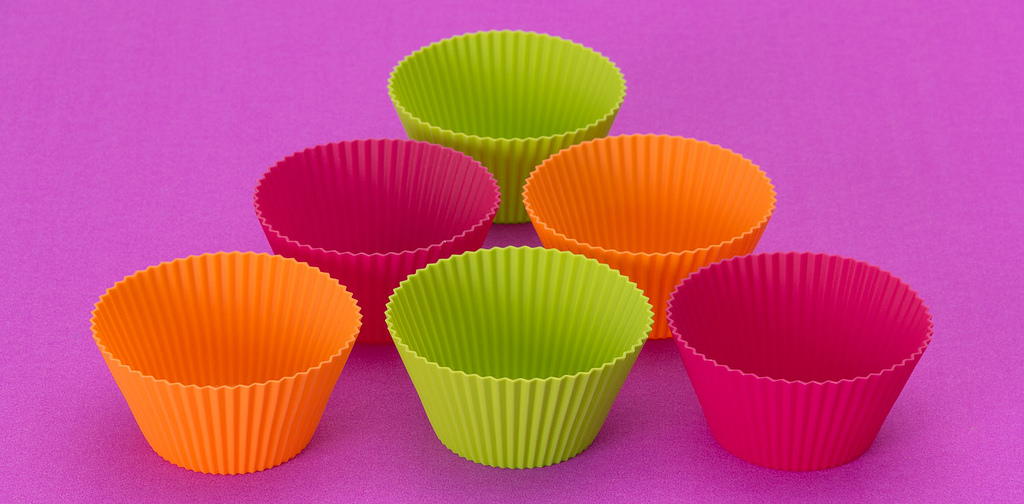Original from “What’s the Deal with Silicone?”
by Ange from My Minimalist Baby
“Silicone is a frequent plastic replacement. For those people trying to live more closed-loop or zero waste lifestyle, then silicone things often come up as alternatives to plastic. Silicone has a lot of similar properties and feel to plastic, and actually some better properties for certain functions too. I personally have a reusable coffee cup with a silicone lid, a silicone menstrual cup, silicone cupcake wrappers, a lid sealer in my ‘plastic free’ glass drink bottle and some silicone covered kitchen utensils.”
The thing with Plastic
Plastic is set apart from other recyclables –like paper, metal and glass– because:
- When it’s recycled, assuming that is even possible where you live and with the type of plastic you have, it is down-cycled (turned into an ever less quality product that requires more and more ‘virgin’ plastic components when created into another product).
Thus so long as plastic is required, oil refineries will be required as we can’t just turn all the plastic we have already created into all the new plastic items we’ll need in the future like potentially we might be able with paper, metal and glass. - It doesn’t ever properly degrade.
Paper and wood biodegrades – essentially becoming food for microbes – it was a plant to begin after all. Metal can usually rust eventually breaking back into a natural mineral for the soil and glass (is essentially just quartz rock made into another form so when it breaks down and rounds off is just back to being a grain of sand like it from where it began). So all these other materials break back elemental forms in the environment.
Plastic, while derived from oil which essentially an organic material (ancient plants and animals which through natural processes over geological time formed into the products like oil, gas, coal and tar); through the magic of chemistry, creates a product that only really breaks into smaller and smaller plastic pieces. It can’t biodegrade or oxidise, it just breaks, which is a massive issue in the environment, especially in the oceans which are becoming more and more full of the stuff which never ever goes away, just concentrates. - There are also a lot of issues surrounding possible negative health impacts of chemicals (e.g. BPA) that leach out of plastic and through your skin which can mimic hormones and potentially increase the risk of diseases.
For this reason many zero-wasters and other environmentalists try to limit the amount of plastic they consume, especially single use plastic! However, the reality of the modern world and just how all embedded and prevalent plastic is, it is impossible to completely avoid.
Ok, so what about Silicone?
A fairly recent material (at least in the way it has become available for household use), it is often touted as the healthier alternative without the same hormone disrupting risks of plastic. It is a completely different material chemically than plastic being made of silicon and oxygen like sand or glass but processed in a way to give it rubber like qualities.
Many people would argue it is not a ‘natural’ product and put it up there with regular plastic. However ‘natural’ is not a proper defining word for anything. Stainless steel is not natural, glass is not natural. Really, only wood is closest to ‘natural’ and certainly the only substance out of the list of things we use that you could have any chance of collecting, processing and making things of it yourself at home.
The environmental credentials of a substance should not rely on the ‘naturalness’ of something. Instead what matters is if it causes any negative health effects, whether it can be recycled and how it might break down in the environment when it is discarded and how much resources like energy and water go into making it (as well as recycling it if that’s possible).
Read Ange’s research on the Health & Recycling reports, Biodegradability and Production of Silicone along with her conclusions.
Alternatives
- Cookware
Use wood or metal and grease your pans. - Menstrual cups
Natural rubber is the better solution as it will biodegrade.
(there is at least one company that makes these) - Sealers
Natural rubber or cork is the better option.
We agree:
“Silicone is far from a more environmentally friendly solution to plastic. Due to its temperature withstanding properties could be particularly difficult to ever break down. We’ll be avoiding this material as much as possible for now.
If you already own some silicone items: Use it and use it and use it until you can not longer because after that it is probably going to have to go to the landfill. And we should all keep an eye out in case they find some new horrible health effect from it as a lot more research is needed over its long term use.”
Let us know your opinions about it. Do you agree? Disagree? Do you avoid silicone items at home as well? What are your thoughts?


I use silicone-coated baking paper for cooking instead of tin foil – and where possible, eg if I’m baking cookies, I clean and re-use the paper too. I prefer wooden cooking utensils – one of my spoons was hand-carved by my son from locally grown timber.
Hi!
Yes, that is the best way to avoid more waste, by reusing the plastic or silicone items we already own. Wood is definitely the best. Well done to you!!
Thank you for passing by and leaving a comment 💚